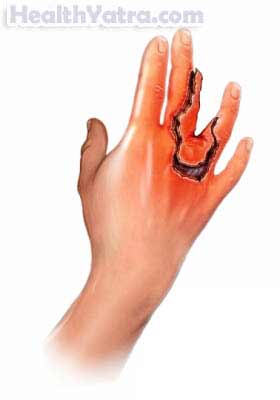Definition
An animal bite is a wound caused by the teeth of an animal. The teeth puncture, tear, scratch, bruise, or crush the person’s tissue. The injury can damage skin, nerves, bone, muscle, blood vessels, or joints.
Causes
Most bites occur when an animal has been provoked. Animals with rabies bite without being provoked.
Risk Factors
A risk factor is something that increases your chance of getting a disease or condition. Most bites occur in children and young adults. Males are affected more often than females. Bites happen more frequently in warmer weather.
Symptoms
Symptoms of a bite include pain and bleeding.
Wounds may become infected due to the bacteria normally found in the animal’s mouth or a systemic infection of the animal, such as rabies. Wounds may also become infected from microbes on the skin or in the environment.
Symptoms of infection include:
- Redness around the wound
- Pain
- Warmth
- Swelling
- Tenderness
- Pus oozing from the wound
- Fever
Diagnosis
The doctor will ask about how the bite occurred, the animal that bit you, and your medical history. The doctor will examine the wound and assess damage to any nearby muscles, tendons, nerves, or bones. If the wound appears infected, the doctor may use a sterile swab to remove a sample for testing.
Other tests may include:
- X-rays
- CT scan

Treatment
The goal of treatment is to promote healing, decrease the risk of infection, and prevent complications. If your dog bit you and it has had all its vaccinations, you may be able to treat a minor wound yourself. However, call your provider for medical advice. Receiving medical care within the first 24 hours decreases the chance of infection.
Seek medical care in these situations:
- Bite from any wild animal (Bites from rabbits and rodents [squirrels, mice, rats] are quite unlikely to cause rabies.)
- Cat or human bites (These are particularly prone to developing rapid and serious infection.)
- Deep or large wound
- Infection
- Five or more years since your last tetanus shot
Regardless of the severity of the bite, see a doctor if you have a chronic medical condition, such as:
- Diabetes
- Liver disease
- Heart or lung disease
- Arthritis or lupus
- Poor circulation
- Cancer
- Immune system deficiency
Self-care
- Wash the wound with soap and water for at least five minutes.
- Apply pressure with a clean towel to stop the bleeding.
- If bleeding does not stop within 15 minutes, seek immediate medical care.
- Place a sterile bandage on the open area.
- Elevate the wound, keeping the area above the level of your heart to decrease swelling.
- Keep the bandage clean and dry.
- Check the wound regularly for signs of infection.
Medical Care
Your doctor can clean the wound, washing the tissue with large amounts of fluid. Debris and dead tissue can be removed. The wound may or may not be closed with stitches. It often is kept open to decrease the risk of infection. After 24 hours, the doctor may use adhesive strips to bring the edges of the wound closer together. Antibiotics may be ordered and a tetanus shot may be given
Be sure to tell your doctor as much as you can about the animal that you bit you and the circumstances surrounding the incident. If the identity of the animal is unknown and it cannot be monitored for rabies, you may need to receive treatment to prevent this life-threatening disease.
If you have had an animal bite, follow your doctor’s instructions.
Prevention
To avoid being bitten by an animal:
- Be aware that most animal bites are from dogs. Dog owners are most likely to be bitten by their own dog.
- Do not try to touch or restrain your own dog when it is injured or fighting with another dog.
- Never approach a dog or another animal that you are unfamiliar with. Do not pet or play with sick or strange animals.
- Do not run past a dog.
- If a dog approaches you, stay calm and let it sniff you. Do not make eye contact. Wait until the dog leaves or slowly backs away. If you are knocked to the ground, roll into a ball and protect your head and neck with your hands.
- Be alert to signs like ear position or bared teeth. These are signs that a dog may bite.
- Carefully select pets. People with children should look for animals with easy-going temperaments.
- Socialize and train your pet.
- Supervise children’s interactions with animals. Teach children to respect animals and not put their faces close to a pet. Do not allow teasing or tail pulling.
- Do not wrestle with or promote aggression in your dog.
- Do not bother an animal that is eating or sleeping.
Animal Bites Treatment in India – Page Keywords:
Animal Bites Definition, Animal Bites Definition Causes, Animal Bites Symptoms, Animal Bites Treatment in India, Animal Bites Treatment Cost in India, Animal Bites Surgery Cost, Top Animal Bites Treatment Hospital, Top Animal Bites Treatment Doctor in India, Animal Bites Meaning in Marathi, Animal Bites Treatment Near me, Animal Bites Complications, Travel India for Animal Bites Treatment, Animal Bites Treatment in Arab Countries, Animal Bites Treatment in Bangladesh, Animal Bites Treatment in Dhaka, Animal Bites Meaning in Bengali, Animal Bites Meaning in Arabic, Animal Bites Meaning in Hindi, Animal Bites Treatment in Bahrain, Animal Bites Treatment in Egypt, Animal Bites Treatment in Iraq, Animal Bites Treatment in Jordan, Animal Bites Treatment in Kuwait, Animal Bites Treatment in Lebanon, Animal Bites Treatment in Saudi Arabia, Animal Bites Treatment in United Arab Emirates, Animal Bites Treatment in Sudan, Animal Bites Treatment in Tunisia, Animal Bites Treatment in Nepal, Animal Bites Treatment cost,
